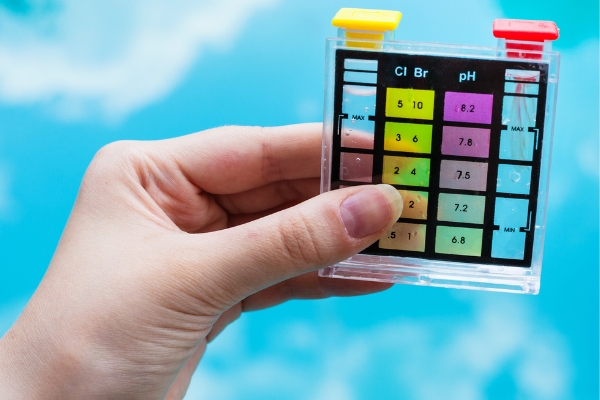Do Water Softeners Remove Chlorine? [With Alternative Solutions]
Do you also find yourself asking whether your water softener will remove chlorine?
Do Water Softeners remove chlorine?
Water Softeners do remove some minerals, but it depends on your filter.
And if you want to remove chlorine from water, read until the end, as I have discussed how the home water system will solve all your problems.
Let’s dive in!
Does Water Softener Remove minerals like Chlorine and Chloramine?
Water softeners are primarily designed to eliminate or reduce the high concentrations of minerals in tap water. The softener removes the water whenever the water is very hard and contains high calcium and magnesium levels.
Through the use of ion-exchange resin beds filled with sodium, water softeners help remove ions. The sodium ion in the resin is exchanged for the hard minerals in the water as it passes through the resin tank. Some of these minerals are captured by resin beads, including chlorine and chloramine.
Water softeners only remove a certain amount of chlorine from the water, so ‘some’ is the operative word here.
In most cases, a simple water softener is insufficient to remove chlorine, but it will commonly remove Calcium, Magnesium, and Iron ions. Is it possible to remove chlorine from water using a water softener? The short answer is yes if you have the right filter.
To answer whether water softeners can remove chlorine and chloramine, we need to learn more about how water softeners work. We also need to learn whether they can remove chlorine from water.
In unfiltered water, there are many harmful contaminants and chemicals dissolved in it. This type of water may also negatively affect you and your family. Aside from that, water contains chemicals that can damage your skin, hair, and clothing.
Using recommended water softeners and GAC (Granular Activated Carbon), these dissolved elements and harmful chemicals can be removed. Below, I have written an overview of how water softeners remove chlorine from water with the help of references from a veteran water systems installer.
How do you Remove Chlorine from City Water?
First, all of your home’s water is purified by whole-house filters, but they do not soften it. This would be the most suitable solution if you would like to treat all water in your home indiscriminately.
A filter of this kind is capable of removing chlorine, among other chemicals.
Getting chlorine-free water is as easy as installing a whole-house filtration system before installing your water softener. The most popular filtration systems are water refiners, 20-inch carbon block systems, or backwashing washing carbon systems.
One drawback of using a cartridge filter, like a carbon block, is that you can only run one faucet at a time to remove chlorine. As a result, a carbon block has very low flow rates, which makes it an option that cannot be described as the best solution (but it is, however, the cheapest).
The filter must also be changed fairly frequently to keep chlorine from accumulating.
As you read above, you can install a whole-house filter to remove chlorine. However, the tank has no drain or control valve. You can fill this tank with many materials, such as granular activated carbon, catalytic carbon, KDF, coconut shell carbon, coal-based carbon, or a combination.
Water softener resins are damaged by chlorine, so this tank helps to remove the chlorine before it enters the softener.
As these tanks are available in various sizes, they can last for many years without maintenance, depending on your water quality and daily usage.
Backwashing filters are another option for removing chlorine from the water. A drain and a valve are included with this type of filtration system. Therefore, it cleans itself every couple of days and repacks the media bed. Your whole house filtration system does not require channeling because of this type of system. Remember, here; it is common for one side of the tank to be used more than the other in some whole-house filter systems.
The water softener is considered the “good” option for your home, while the water refiner is considered the “better” option. When getting the most efficient water system for your home, you will need to invest in a whole-house system. In these setups, drinking water is filtered. As a result, you and your family will have clean water for everything you need!
Drinking water should be filtered because it can pick up microbes and lead from the treatment plant. You can be sure that whatever you drink is clean and safe as your water filters right at the tap. As a bonus, it tastes better as well.
Tasty filtered water will only help you take your coffee and tea experience to the next level. Hydrating your body throughout the day is made easier by this availability of delicious water.
You won’t have to worry about your water once you install a home water system. A chlorine-free water system is much healthier for us, and softer water helps us do chores and clean faster, won’t you say so too?
What Chemicals does Water Softener Remove?
The purpose of a water softener is to remove calcium and magnesium from hard water. If you leave these minerals in your water, your faucets will build hard deposits and your clean dishes will get water spots too. Additionally, not only does hard water dry out your skin and hair, but it also makes your laundry rough and harsh as well.
A water softener removes hard water minerals by filtering them out. The water gets soft as a result of the water softener’s process. This makes it easier to rinse clean, which has numerous benefits. Soft water usually performs better with water-using appliances since it is free of minerals. As a bonus, your home’s water heater will also last longer, provide softer laundry, and even give you cleaner dishes than before.
Calcium, magnesium, and other minerals are removed from drinking water by water softeners, which are also called ion exchange units. As calcium and magnesium are trapped within the resin beads, sodium or potassium are typically exchanged for them. Calcium and magnesium are removed from resin beads by soaking them in a highly concentrated salt (sodium) or potassium solution.
The chloride solution that has passed through the beads eventually ends up in the drain and, ultimately in the environment.
How Chlorine affects the Water Softener Resin?
It’s unfortunate, but water with high chlorine levels will damage resin beads, significantly impacting your water softener’s performance.
Using water that still contains chlorine will shorten the softener’s lifespan significantly. The chlorine produced by a water softener will oxidize resin beads if the chlorine level is greater than 1.0 ppm. You may experience a 50% reduction in resin life due to this oxidation.
Despite having a fixed lifespan, resin beads deteriorate rapidly when exposed to tap water with high chlorine levels. Polystyrene and divinyl benzene (DVB) is the resin beads’ main materials. DVB holds beads with their adhesive properties, while polystyrene binds hard minerals together.
As chlorine is an oxidizing agent, it not only dissolves DVB but also leads to the breakdown of the resin beads, which makes them ineffective. Because of this, if your water softener has resin beads high in chlorine, the beads’ life expectancy is reduced, and performance is reduced simultaneously.
Conclusion
Now, then before you go…
Keep in mind that only a whole home water system will get rid of chlorine effectively. Even the best-rated water softeners will fail to eliminate chlorine without proper filters.
Now, then, happy dechlorination!
FAQs
Does Salt Water Softener remove Chlorine?
Short answer: no. Water softeners are not capable of getting rid of chlorine. With a whole house water softener, you will not only get soft water through ion exchange but also the chlorine from your tap water will be removed. Public water supplies often contain chlorine, which can pose a problem if you’re using them.
Do Water Softeners add Chlorine to Water?
A water softener cannot add chlorine to the water as it cannot do so. Your water has chlorine because the city added it to the water treatment plant when it was being built.
Your water softener will not be able to remove it with just resin beads alone, and you will require additional help from a whole home water system.
Does Freezing Water remove Chlorine?
No, freezing does not remove chlorine. It is very important to note that if your water is chlorinated, you must filter it before reaching your ice maker. Wash it well if you plan to have ice made from chlorinated water.
It will again smell like pool water when it warms up during melting. Freezing and melting again, the trapped chlorine gas in the water gets released rapidly.
You can, in turn, eliminate all the chlorine from tap water by boiling it for 15 minutes to release the chlorine. It is a fact that chlorine gas weighs less than air, so it will naturally evaporate at room temperature without boiling. However, bringing water to a boil will help speed up the process of removing chlorine.

